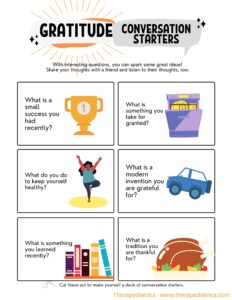Blog
How to talk to your child about gratitude
 Teaching kids how to express gratitude in a way that makes them think about what they are appreciating is different than conditioning them to be polite and say thank you. Most parents teach their kids when to say “please” and “thank you” at a very young age and these become automatic thoughts and actions. An automatic thought or action is what happens in response to a specific trigger. So in this case, people are taught when someone gives you something, the trigger, the response is to say “thank you.” This is a great way to teach people how to be polite and remember their manners. Does this really help us to practice gratitude though?
Teaching kids how to express gratitude in a way that makes them think about what they are appreciating is different than conditioning them to be polite and say thank you. Most parents teach their kids when to say “please” and “thank you” at a very young age and these become automatic thoughts and actions. An automatic thought or action is what happens in response to a specific trigger. So in this case, people are taught when someone gives you something, the trigger, the response is to say “thank you.” This is a great way to teach people how to be polite and remember their manners. Does this really help us to practice gratitude though?
The difficulty in situations where there is an automatic response is that our awareness of what we are appreciating or being grateful for can decrease. Ask yourself, how many times do you say thank-you to others without really stopping to process what you are thanking them for? Let’s take the example of giving someone a gift that you have taken the time to pick out based on their interests. Maybe you have a friend who has been under a great deal of stress and likes to knit. To help your friend feel better you take the time to buy a special skein of yarn in their favorite color. Does it feel different to you when someone says “thank you” versus “I really appreciate the time and thought you put into picking out something you know I would like” or “wow, this was a great pick me up after a hard week; thank you.” The time and thought we put into showing our gratitude and appreciation is just as important as just acknowledging an action.
So how do we help our kids to be more mindful about gratitude?
- AWARENESS: Increase awareness by having conversations about what there is to appreciate in everyday life. Help your children to recognize the small successes that happen daily in addition to big, more noticeable positive situations.
- FEELINGS: Introduce more language around being thankful by identifying feelings such as appreciation, generosity, and mindfulness.
- THOUGHT: Instead of reacting, help your kids to spend some time thinking about why they should be appreciating a situation. Talk about why someone may have given them a specific gift or compliment.
- EXPRESSION: This is when we can help our children to act on their thoughts and feelings by showing their gratitude towards others. Work with your children to brainstorm ways to show appreciation. It can help to ask your kids what makes them feel good when someone recognizes something positive they did.
For ideas on how to start conversations with your kids about gratitude and increase their appreciation download our Gratitude Conversation Starters.
